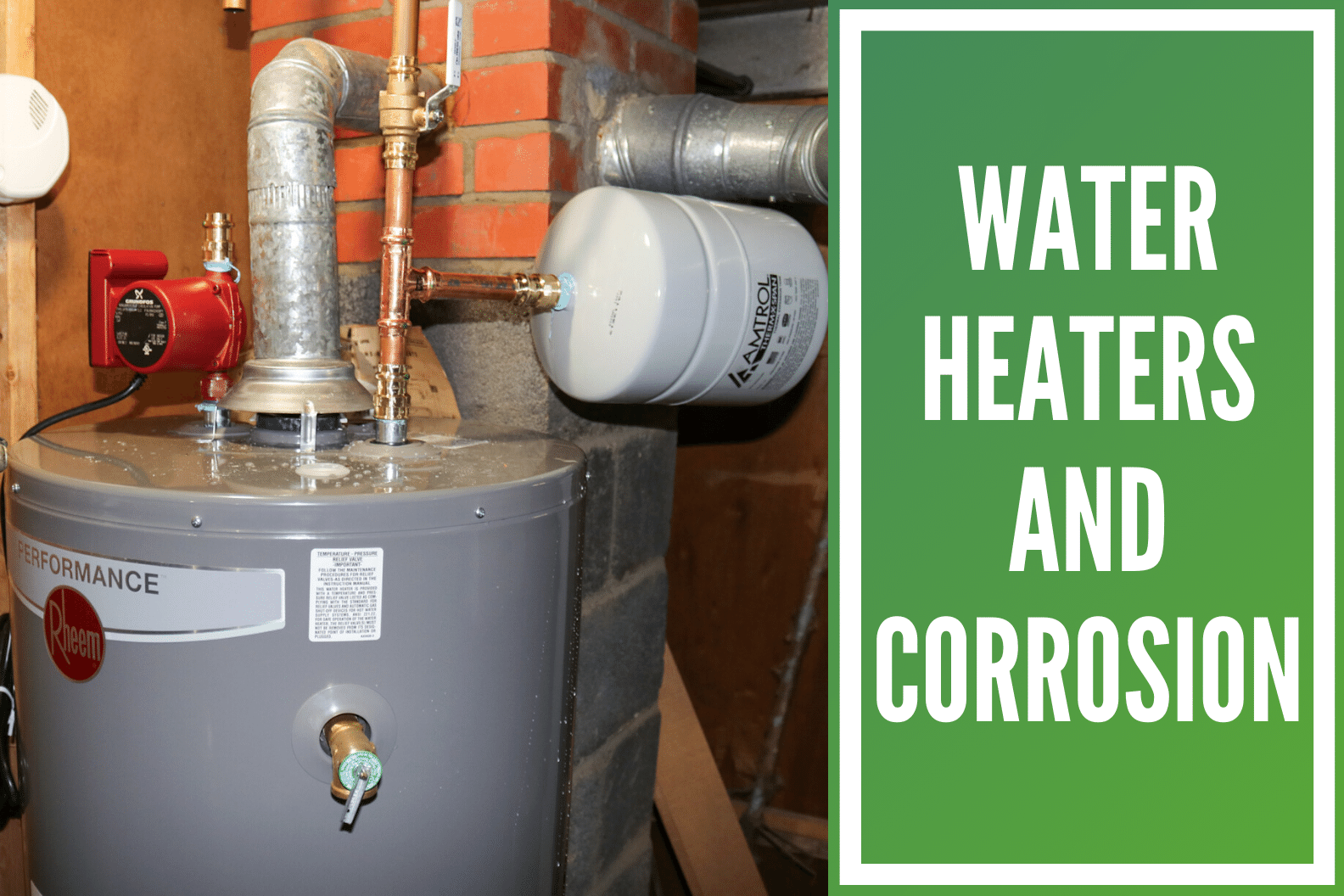Corrosion. ScienceDirect defines this as “an irreversible interfacial reaction of a material (metal, ceramic, polymer) with its environment which results in consumption of the material or in dissolution into the material of a component of the environment.” With a definition like that, I’m guessing you don’t want to hear corrosion and plumbing in the same sentence. When it comes to residential water heaters, corrosion arises as a result of an oxygen/water mix coming in contact with metal.
Fortunately, most modern-day water heater manufacturers are well aware of the damages capable of popping up because of corrosion. Many of these manufacturers have made a concerted effort to ensure their models are able to resist corrosion. Whether it be the interior of the tank being lined with glass, the pressure relief valve allowing for an air cushion or the anode rod protecting against rust, they are well prepared to resist it. However…that doesn’t mean corrosion isn’t a possibility.
In this week’s blog post, we’ll take an inside look at corroding water heaters and point out the things Kansas City homeowners should know to prevent it from becoming a major headache!
Tankless Water Heaters Can Corrode
Before diving into the traditional tank-style water heaters (which account for the majority of units installed), we’ll examine tankless water heaters. Tankless models have gradually grown in popularity over the last handful of years and are quickly becoming a fan-favorite for their ease of use. First and foremost, it’s important to acknowledge that corroding tankless water heaters occur much less frequently than with their tank-style counterparts. This is largely because of the fact that there’s less contact between metal and water.
The main thing to look out for will involve any water dripping on the gas burners. This CAN cause corrosion and will negatively impact the effectiveness of the burners. With that being said, the easiest way to keep your tankless water heater functioning properly is to perform routine maintenance. This can be said for all plumbing fixtures, as regular maintenance is essential. Even something as simple as flushing out the built-up sediment can go a long way!
For a complete guide on maintaining tankless water heaters, be sure to check out our recent blog HERE. In it, you’ll find a map of water hardness in the United States, as well as frequency in which you should be flushing/descaling your water heater.
How Manufacturers Prepare Against Corrosion
As briefly mentioned in the introduction, water heater manufacturers are well aware of the dangers of corrosion. Over the years, they’ve carefully engineered strategies for protecting against it. There are really three main ways in which water heaters are now built to resist corrosion for as long as possible.
- Inside of the tank is lined with glass. Even though technology has certainly advanced over the years, traditional water heaters are built with the same, general methodology. Inside the steel tank you’ll notice a glass lining bonded to it. This is to keep the inside from rusting. What separates the more expensive options from the lesser alternatives? The quality of glass lining.
- Pressure relief valve. All water heaters have a pressure relief valve installed on them. The job of this valve is to allow water/steam to flow out of the heater if the temperature or pressure were to exceed a certain limit. Without allowing air to enter the tank as well, it’s also responsible for keeping the water heater from exploding!
- Anode rod. Lastly, we have the anode rod. This is a part that may need replacing every few years in order to avoid having to replace the entire unit. It runs down through the tank and is essentially a steel wire encased by either aluminum, magnesium or zinc. Without getting too scientific on this, a process known as electrolysis is responsible for the metals absorbing rust (caused from water coming into contact with metal). Keep in mind though, this electrolysis is going to also cause the anode rod’s metal to corrode. With this in mind, regular maintenance will detect this and allow your licensed plumber to know when it’s time to replace the anode rod.
Does Corrosion Automatically Mean You Need to Replace It?
Whenever we discuss water heaters nearing their end with homeowners, one of their first questions is whether or not a replacement is absolutely needed. Will a repair suffice? To be completely honest, the short answer is that a replacement is likely needed. It’s not a 100% guarantee, but a corroding water heater is a serious plumbing problem and requires the attention of an experienced plumber right away!
If the corrosion is on just one component (say the heat exchanger for example), you might be able to get by just replacing the specific part. However, if you’re dealing with a water heater that’s been running for over 10 years or the corrosion is on the tank itself, chances are it’s already spread and a replacement will be the only option! The best piece of advice we can give here is to lean on the opinion of your plumbing technician. They’ll be able to recommend whether a repair is going to last more than a year or two. This will help greatly in determining which is the smarter investment.
Do You Have the Right Water Heater?
Any opportunity you have to be proactive when it comes to plumbing issues is going to be worth your time and effort. In order to prevent your water heater from dying out early, it’s important to have it be the right size for your particular usages. Any experienced plumbing company will be able to recommend a particular size based on a number of variables:
- Number of people living in the house
- Number of bathrooms
- Number of appliances
As you’d likely guess, purchasing a water heater that’s not big enough for the responsibilities it will handle can easily result in it breaking down earlier than expected. Like we mentioned with the section above, the best thing you can do is lean on the opinion of your plumber. For example, here at Stine-Nichols, we have a set list of water heater models and manufacturers we purchase from. Based on your household’s hot water usage, we’ll be able to provide a few options that fit within your budget.
Is Your Water Heater Corroding? Call Stine-Nichols Plumbing!
As we often say, putting off plumbing problems typically isn’t the wisest move! It doesn’t take long for a small issue to quickly develop into a major headache! When it comes to being a homeowner, there’s plenty of potential problems you need to be mindful of, including a corroding water heater.
Here at Stine-Nichols Plumbing, we take pride in providing nearly every residential or commercial plumbing service there is. Our process is simple: (1) Give us a call at (816) 348-3481 or fill out this free quote form. (2) Our project manager, Jim, will be in touch to provide you with an estimate. (3) One of our experienced technicians arrives at your home and gets the plumbing issue taken care of as efficiently as possible. As always, it’s all about providing long-lasting and knowledgeable repairs, all at an affordable price.
Want to see plumbing content straight from our job-sites and meet some of the Stine-Nichols team? Give us a follow on Facebook and Instagram. We regularly post project photos, videos and tips to keep your plumbing system running smooth!


